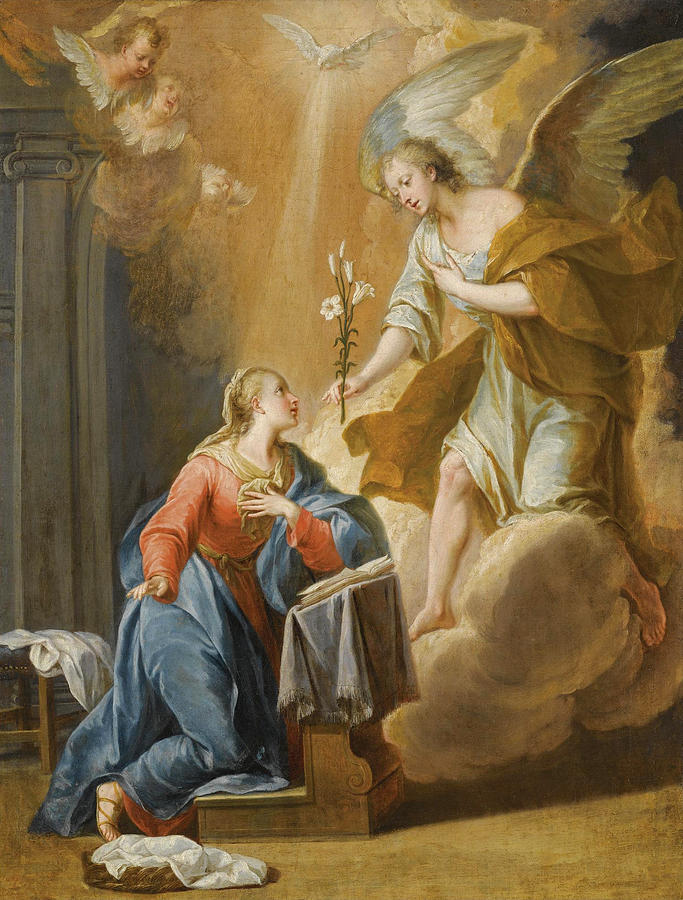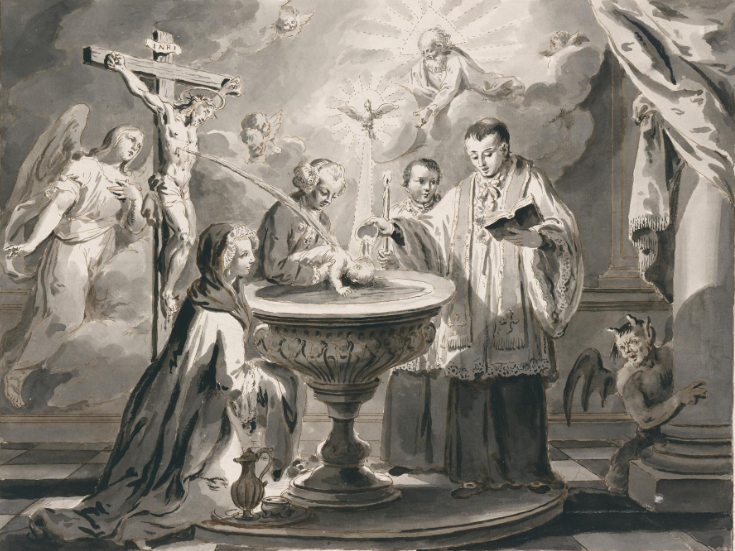Pinned Post 
The Annunciation, Niccolo Bambini

Transcription of Homily
Reading from the Epistle of blessed Paul, the Apostle to the Romans:
Brethren, it is now the hour for you to wake up from sleep because our salvation is closer than when we first accepted the Faith. The night is far gone, the day drawing near. Let us cast aside deeds of darkness, and put on the armor of light. Let us live honorably, as in daylight: not in carousing and drunkenness, not in sexual excess and lust, not in quarreling and jealousy: instead, put on the Lord Jesus Christ.
Continuation of the Holy Gospel According to Luke:
At that time, Jesus said to His disciples: There will be signs in the sun, the moon, and the stars, on the earth nations will be anguish distraught at the roaring of the sea and the waves. Men will die of fright in anticipation of what is coming over the earth for the hosts of heaven will be shaken loose. And then men will see the Son of Man coming on a cloud with great power and glory. When these things begin to happen, stand up straight and raise your heads for your redemption is near at hand.
And then He told them a parable: “Notice the fig tree and trees in general, when they are budding you see them and know for yourselves that summer is near Likewise when you see these things happening you know that the Kingdom of God is near. Let Me tell you this: the present generation will not pass away until all these things happen. Heaven and earth will pass away, My words will never pass away.
The Saving Words of the Gospel.
In the name of the Father, and of the Son, the Holy Ghost, Amen.
Baptism from The Seven Sacraments, Pietro Antonio Novelli, 1769
Heaven on earth will pass away, but My words will never pass away.
We begin every Advent with this set of readings, the Epistle to the Romans and this something for ourselves in this moment. And then we have this gospel from Luke, which speaks about the end times in all of this to kick off the beginning of this season and of indeed of our liturgical year. There are three comings of Christ, the first was in silence and humility, what we’re preparing for right now. Then the coming of Christ into our souls in baptism, and then all of that was done with great humility and discretion and silence, without great solemnity. And then there will be the triumphal return of Christ at the end of time, in which every one of needs will take notice.
A childhood hero for me was Bishop Kung of Shanghai. He was arrested by the Chinese Communists, the same ones who brought us a manmade virus recently. Yeah, so that same fame and when he was arrested, he was put in prison for 30 years allowed to leave any time he wanted, as long as he renounced fidelity to Peter. And, obviously, he stayed in prison. He chose to be a prisoner of men, so as to be a faithful servant of our Lord.
When he was released, thanks to the diplomatic machinations of President Reagan, and before he left China, the Chinese wanted to show how lenient they were on him after 30/33 years in solitary confinement, most of it and they had a banquet in which he was there and Cardinal Jaime sin of Milan was there. So this is the first time that he had seen another Bishop of the Catholic Church. And they kept them at a distance that there was at a table there were 20 Communist officials, on either side of this long table. All they could do is wave to each other. They couldn’t speak to each other. And one of the communists suggested each one sing a song. And so when it got to Cardinal Kung, he sang Tu Est Petros, “You are Peter”. And his communist handlers said, What are you trying to show what side you’re on? He says, Everybody knows what side I’m on. That hasn’t been a secret.
When he got out of prison and then was brought to America, I was fortunate enough to meet him as a young seminarian, this childhood hero of mine, and he said when he saw so many things that had happened in the Church in the world, he wished he had stayed in prison. And he said, I was under the impression that I was being supported by all of the fasting and the abstinence and the sacrifices of Catholics during Advent, during Lent, on Ember days, on Rogation days, only define that they drop the cross. You know, the teaching of the Mystical Body is that the virtues of one person affect the entire body just as the sins of one are not left in a vacuum, they affect the entire Mystical Body, there is no private virtue, there’s no private sin, everything has an effect. It reverberates through the Mystical Body. In so if he felt that he was being supported by us who had dropped the cross, because we decided that Lent was a time for holiday parties and not fasting, then perhaps the reality of the situation was that he was supporting us with his sacrifices. He was the one who was carrying the cross that is conditional for following Christ.
There are two strong penitential seasons Lent has the sense of penance for our sins. And so there’s a grief there’s a sorrow and in the core of that penitential spirit is joyful trust. Advent is also a penitential season. The Orthodox put us to shame in their fasting during Advent. They have a very strict fast, called the Nativity Fast. We used to, we had the Martin St. Martin Fast start on the feast of St. Martin, November 11, all the way up to Christmas Eve; no meat, no dairy products, no fish, except on Christmas Eve, and then on Christmas Day, you could have some meat. That was pretty much a practice. Others had three days it wasn’t uniform in the West. We had, for example, the Synod in Gaul in the early sixth century. That established three fast days, a week, Monday, Friday, Monday, Wednesday, Friday, or all of Advent, and so it wasn’t very uniform. In the 1880s, the American bishops in a conference in Baltimore, said that all of the Fridays of Advent are fast days. And then the bishops of England, Ireland, Canada, Australia said, Wednesdays and Fridays are fast days in Advent that was already in the 20th century.
And now we have to ask ourselves, okay, this isn’t the official discipline, but what am I doing? What am I doing? In preparation and joyful preparation for the coming of Christ? Well, we can start by heeding the words of St. Paul. It is now the hour for you to wake up from sleep. What is this waking up? Nepsis is the word for being awake, alert, vigilant. And the Eastern Fathers, the Desert Fathers, they would be called Neptic Fathers because they were in a state of constant vigilance. Over what? Well, we have a certain vigilance and expectation for the coming of Christ. We know the date of his birth, obviously. We also have another expectation of the coming of Christ at the end of time. But if heaven and earth pass away, in His words, don’t pass away, His words come to us constantly in our interior and where the more we dedicate to time we dedicate to Adoration, to mental prayer with Scripture, the more we attune our inner ear to that voice that never dies away.
But we’re in a world of competition. How many things do we do in an hour or in a day without thinking? How many times we just look at a phone or a screen? How many times we walked by the fridge open the door and the knob nothing’s changed over the last five minutes and they close the fridge door again. How many times do we do things without thinking about them? We become in a certain sense automatons. We can be like sleepwalkers. And we do things without thinking about them. I’m not talking about bad things. We’re just talking about things, thoughtless things. And that’s not worthy of us. Sure, we have a routine of things that we do, but because we do them and they’re part of our duties as parents or as workers and students, whatever they may be, they have value. They can be offered up to our Lord in reparation for our sins, they can be offered up to the souls in purgatory, they can be offered for conversion of sinners, they can be offered in gratitude for the many graces that He’s given us. These things can have a meaning. For Our Lady of Fatima said, Make everything a sacrifice, then why not make a sacrifice of everything and offer it to our Lord, it has value, it’s like gold, we can be buying souls.
This vigilance, though, it’s not just about thoughtless things, it’s about the thoughts I have the movements in my heart and my passions. And they, if I’m not vigilant, they can become, and show, themselves to be wayward. I think about things, a real problem to inner life is watching the news. Or getting on blogs, especially Catholic blogs, we don’t help ourselves very much by spending time with this noise. Because the more we do that, the less we are attuned to the voice of God. And we become automatons who follow concupiscence we follow passions, we follow the spirit of the world. And you know, I saw this t-shirt the other day, stay woke, stay angry. Well, that’s not really Advent preparation, okay, there is a difference between woke and awake. When we are awake, we are alert to those things going on within us. And we ask ourselves, what is this thought? This affection in my heart is passion is movement, whatever, we’re not Buddhists, we don’t repress or deny our passions, we recognize that they’re there and that they have a role to play. And so, what do we do? We give them to Christ, we take charge.
This is what Paul is talking about when he says we take captive our thoughts, so that we don’t follow what happens interiorly we take charge and we give it to our Lord, we allow Him to take charge. So that our affections, our passions, our thoughts, they are oriented towards our beloved, they belong to Him. And then we ask not ourselves, in hindsight, was that a sin? Was that bad? Actually, the question that we’re asking is our Lord in the present moment, does this give You glory? Is this good? Does this please You? When that’s what’s driving us, then we start to be a little like those Neptic Fathers who are in constant vigilance of all of the internal workings, our thoughts, our passions, the movements of our heart, and we’re checking them to see if they give God glory. And if they don’t, we give Him everything we give them. We give them everything. We so that even our temptations can serve us because they allow the temptation to be the first instance the first moment in which I make a choice for Christ. Lord, I love you infinitely more than this passing temptation, and we’re victorious every time.
There is another type of vigil, a watching that Carthusians do, many monastics do in the East in the West, they get up in the middle of the night and pray. This is something that is very dear to our Lord. This idea of vigil, to pray at night when everybody is in bed. To pray at night in give Him some of our time to pray for those who might fall into sin. To pray for those who have sinned for their repentance. To pray in reparation for our own sins. To accompany our Lord, to accompany our Lord, when everybody else is asleep. Not everybody can do this because of health. Nobody can do this because of their duties. But it certainly is a practice within the Church, a healthy wholesome practice. Sometimes though, we just wake up. And when we wake up, that’s a call to prayer. So that we can truly be awake, awake in the middle of the night if we if our Lord or angel wakes us up and awake during the day to all of those interior movements, making sure that they are worthy of a spouse of Jesus Christ and worthy of Him so that we can give them to Him and transform them so that He can transform us. And in that way, we’re not sleepwalking. We’re not automatons. We are walking. We are like the wise virgins awaiting the coming of our spouse who will come in the middle of the night and we are ready with lamps full.
In the name of the Father, the Son, the Holy Spirit, Amen.
— Fr. Ermatinger

